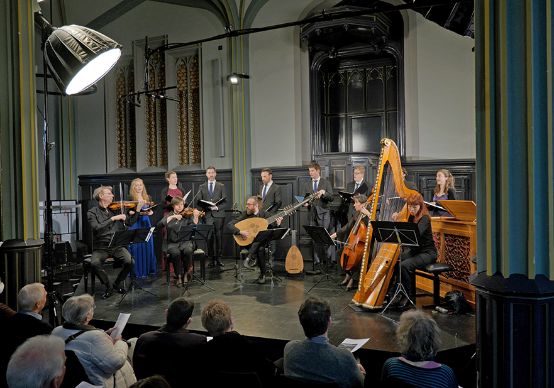Early Music Festival Zurich: postponed program, reliable partners
The Early Music Festival Zurich presents an old program - and thus unexpectedly comes to an anniversary concert.

It's rare to be able to visit two festivals in one. But this spring not only saw the 36th edition of the Early Music Festivals Zurich The reason for this strange numbering is simple. Two years ago, the beautiful program "Tageszeiten - Jahreszeiten" was lost in the surf of the first corona wave. And since early music does not tend to thrive on the topicality of the day, such a program could easily be postponed until later. However, it would also have been a shame to simply let the cleverly compiled musical passages through the course of the year and day disappear into oblivion, especially as there was a lot of conceptual work behind it.
To get an impression of the diversity of the program, just a few keywords are enough. While the St. Gallen Bach Foundation, for example, led us through Bach's church year with excerpts from various cantatas, Els Biesemans presented Fanny Hensel's magnificent piano cycle on the fortepiano The year. Or Christopher Simpson's cycles The Monthes and The Four Seasons - performed by the Cellini Consort and the Sirius Viols - combined with excerpts from Samuel Pepy's diaries from 1660-1664 and 1665-1669, respectively, spoken by Aaron Hitz. It was even courageous to respond to Vivaldi's hit Quattro Stagioni in the original and instead use the Les Saisons amusantes mentioned adaptation by Nicolas Chédeville. It is details such as these that indicate the value of this festival. Two years ago, the 400th birthday of the composer and nun Isabella Leonarda was taken as an opportunity to draw attention to the important role of female composers in Italian music of the 17th century. Even though this anniversary is now past the statute of limitations, the cause remains justified and, above all, it is still worth getting to know the music of Isabella Leonarda.
Years of familiarity in the Basel vocal ensemble
For another concert, the postponement turned out to be a "stroke of luck". For the original 32nd edition, the still young Basel vocal ensemble Voces Suaves the program "Times of Day and Seasons in Mantua". Now, two years later, the concert unexpectedly coincides with the ensemble's tenth anniversary. Two years, mind you, in which the career of Voces Suaves really took off despite the pandemic, as the founder, baritone Tobias Wicky, explains on the phone. The festival also benefited from this increased reputation, as the sold-out concert on March 19 at the Helferei Zurich proved. But it also showed where the success comes from.
This begins with the program, which sheds light on a curious aspect of music history. Two politically insignificant Italian principalities, the Mantua of the Gonzagas and the Ferrara of the d'Estes, became centers of music in the 16th century. Small worlds that radiated out into the larger world. The ensemble members responsible for the programs, Dan Dunkelblum and Davide Benetti, combined madrigals by the incomparable Monteverdi with those of his predecessors in Mantua: Giovanni Giacomo Gastoldi, Salomone Rossi and Giaches de Wert. The ensemble's high regard for the music of the Flemish-born de Wert is particularly striking and is explained by Tobias Wicky, among other things, by the fact that he was one of the first madrigal composers with whom Voces Suaves became involved. Another reason to dedicate an entire CD to him, which will be released in the fall.
The ensemble is therefore characterized by a certain loyalty that also proves itself musically. The familiarity that has developed between the eight singers over the ten years they have worked together was palpable and audible during the concert; the voices blended perfectly, even though two members had to be replaced due to illness. The ensemble also takes care to create continuity with the replacements and relies on familiar faces, especially in the intimate genre of madrigals. This familiarity is due to another special feature: the Voces Suaves work without a musical director and develop their interpretations in a quasi-democratic manner. A sometimes nerve-wracking process, but one that Wicky says is worth it.
And it works, not least because the cooperation with other ensembles constantly provides impulses from outside. The collaboration with the Capricornus Consort Basel, for example, has proved its worth. Also heavily reshuffled due to illness, under the leadership of Peter Barczi, it provided congenial accompaniment to the various madrigals and demonstrated the energy of the music of this period in the purely instrumental sonatas. However, Tobias Wicky considers the collaboration with festivals to be extremely important, without which it would be impossible for an ensemble like his to manage larger projects. And cites Monteverdi's Marian Vesperswhich will be performed by the Voces Suaves at the 37th Festival Alte Musik Zürich this fall.








